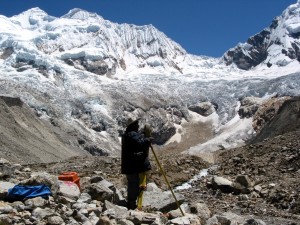Mountaineers have been climbing peaks worldwide for centuries. Although today we often think of climbing as strictly recreation, mountaineering has historically been integral to global exploration, political conquests, scientific studies, and tourism economies. What’s more, the ideas and values climbers carried into the mountains reveal a lot about how societies have understood nature, landscapes, risk, travel, and socio-cultural relations.
Carey has studied the history of mountaineering in Peru, examining in particular the way mountaineering and science intersected during the twentieth century. The focus of one article on “Mountaineers and Engineers” is on the place of Austrian glaciologist Hans Kinzl in Peruvian history and local perceptions and interactions with Kinzl, who climbed Cordillera Blanca mountains and studied the glaciers, among other things. Carey demonstrates the complex relationships among power and knowledge, recreation and economic development, and cultural perceptions and imperial plans.
Another article from the Glacier Lab examines the historical role of mountaineers as citizen scientists in the Andes. The article suggests that “Observations and even data collection from the mountaineering community that includes climbers, guides, and porters has contributed to glaciological research and diversified glacier knowledge, with the ideal end result being increased knowledge generation and sharing, expanded public awareness, reduced risk of glacier-related disasters, and improved environmental management to help a broad range of stakeholders.” Click here for more details.
